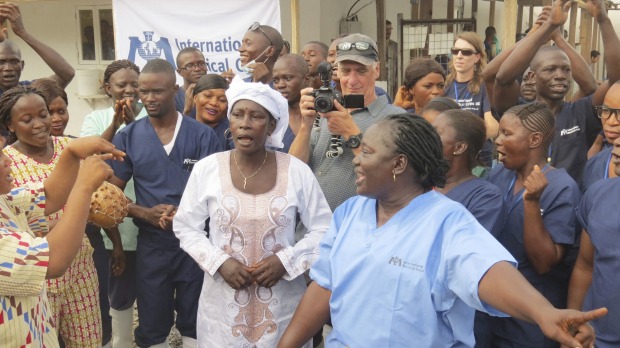
Adama Sankoh, 35, centre, who contracted Ebola after her son died from the disease, is discharged on Monday. Photo: AP
Sierra Leone’s last known Ebola patient emerged from a treatment centre on Monday singing and dancing, marking a celebratory start to the 42-day countdown to the country being declared free of the virus.
President Ernest Bai Koroma? was among a joyful throng waiting to receive Adama Sankoh? on the outskirts of the north-central city of Makeni?. He presented her with a discharge certificate, as staff from the International Medical Corps facility clapped and beat drums.
“Everyone just wants this to be over,” said Bill Boyes, a spokesman for the Los Angeles-based group that cared for Ms Sankoh.

A health worker cleans a man’s arm before injecting him with a Ebola vaccine in Conakry, Guinea, in March. Photo: AP
Sierra Leone was one of the three West African countries hardest hit by Ebola, accounting for half of the about 27,900 people who were infected by the virus and nearly a third of the 11,284 killed in the biggest Ebola outbreak on record, according to the World Health Organisation.
The country has not recorded a new case since the beginning of August, but the WHO won’t declare it Ebola-free until six weeks after the last patient is discharged or buried. That is twice the maximum incubation period of the virus.
Even then, the president cautioned the crowd Monday that Sierra Leone won’t be safe until Ebola has been eradicated from the region. In neighbouring Liberia, new cases were detected nearly two months after the country was declared free of the virus in May.

The survivor board at the Aspen Medical headquarters in Canberra. The company has been contracted by the US and British governments to keep Liberia free of Ebola for the next six months. Photo: Jeffrey Chan
“The Ebola fight is not yet over. Go and tell members of your community that,” Mr Koroma was quoted as saying by The Associated Press.
Guinea, where the epidemic began at the end of 2013, is still grappling with a small number of cases. Health officials in that country lost contact with 45 people who may have been exposed to the virus, the WHO warned in a report last week.
“Several high-risk contacts have also been lost to follow-up in the Sierra Leonean capital, Freetown,” the WHO said.
Ms Sankoh, 35, contracted the deadly virus from her young adult son, Moussa, who returned to his home village from Freetown for a visit at the end of the Muslim fasting month of Ramadan in July.
She began exhibiting symptoms soon after and was admitted to the Makeni treatment facility in early August, as was a nephew, Alhaji Sankoh.
“When she came in, she was quite ill and depressed,” Mr Boyes said. “But as she grew healthier, she brightened up. When Alhaji was released she was singing and dancing.”
The excitement continued to build on Sunday, as fellow survivors who volunteer at the centre arrived to do Ms Sankoh’s hair and help her pick a new outfit for her release.
Early on Monday morning, staff arrived in full protective gear to collect her old clothes and escort her through a chlorinated shower, which they have dubbed “the happy shower”.
When she emerged, she was dressed all in white, in a traditional gown and headscarf, Mr Boyes said. She was then invited to add her hand print to a survivors’ wall and left the centre at the head of a procession of singing, clapping and drumming caregivers.
“Although my child died of Ebola, I am very happy that I have survived,” Ms Sankoh told the waiting crowd, according to the AP.
She appealed to the president to provide more help for survivors, noting that she might need care again.
The disease has left some patients with persistent health problems, including lost vision, joint and muscle pain, chronic fatigue, depression and psychological trauma, said Dr Vanessa Wolfman, the International Medical Corps’ medical director in Sierra Leone. At the same time, it has ravaged local healthcare facilities, some of which became sources of infection for employees and patients.
As the country struggles to rebuild confidence in its battered health system, it is also grappling with the economic effect of a disease that has kept farmers from their fields and left many communities under quarantine for months.
“So there are a lot of challenges still ahead,” Dr Wolfman said.
